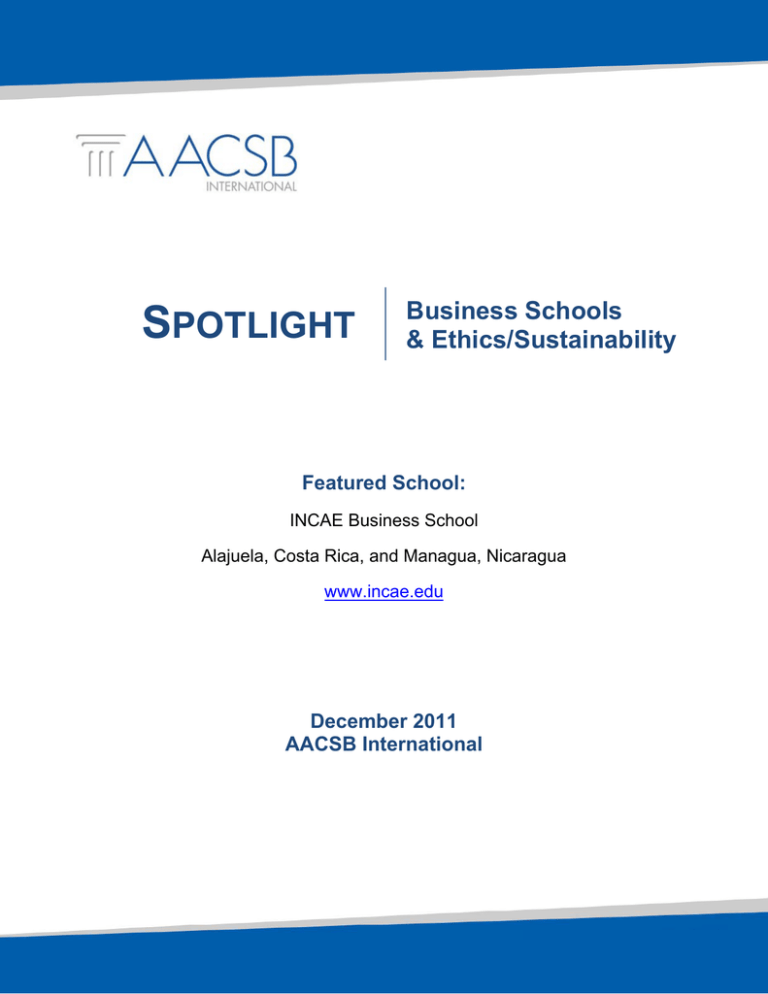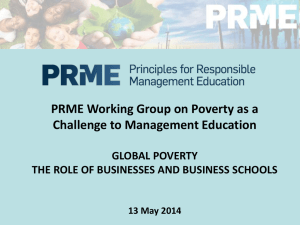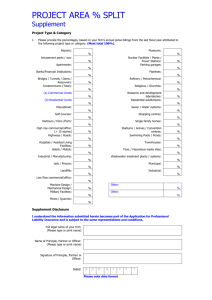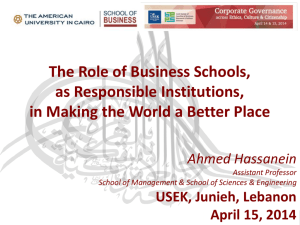
SPOTLIGHT
Business Schools
& Ethics/Sustainability
Featured School:
INCAE Business School
Alajuela, Costa Rica, and Managua, Nicaragua
www.incae.edu
December 2011
AACSB International
SPOTLIGHT | Business Schools & Ethics/Sustainability
INCAE Business School | 2
INCAE Business School: Leading in Sustainable Development
Most modern business schools have gradually awakened to the idea that teaching ethical concepts and
sustainable perspectives on business is important for the education of future managers and business
leaders. However, as the INCAE Business School demonstrates, it’s one thing for a school to the work to
incorporate such ideas into existing courses and programs, and another to be quite literally founded on
those principles.
Shaped by Context
The Instituto Centroamericano de Administración de Empresas (INCAE) first opened in Nicaragua in
1964, with technical supervision and counseling from the Harvard Business School, as well as support
from USAID and the governments and business communities of several Central American nations,
including Costa Rica, El Salvador, Guatemala, Honduras, Nicaragua, and Panama. Each founding
country has an associated National Committee, which serves to offer advice, support, and promotion of
INCAE activities in their respective nation, though INCAE serves the needs of other nations in the region
as well. In 1982, Ecuador became the seventh nation, and the first in South America, to support INCAE
with a National Committee, due to its identification of developmental needs similar to those of the original
six countries.1 Two years later, a second INCAE campus was opened in Costa Rica to accommodate the
growing institution.
The current president of INCAE Business School, Arturo Condo, notes that from the very beginning
INCAE’s mission has included bringing positive change to the region through fostering dialogue,
education, and research on sustainable development. He recalls that INCAE’s founding chairman,
Salvadoran business leader Don Francisco de Sola,2 made a speech to a 1969 graduating class. In that
speech, Condo says, without using any of the modern-day terminology of sustainable development, de
Sola spoke about how INCAE was developed to help create wealth and employment for the region, but to
do so in ways that eradicate poverty, and address the issues of social justice and ecological preservation.
The context of the school’s locale has brought issues of ethics and sustainable development to the fore
for INCAE throughout its history. In Central American countries, President Condo says, there is
oftentimes a disconnect between what is legal in business, and what is ethical or moral. This makes the
business cases involving such dilemmas that INCAE has developed for its mandatory ethics course
particularly salient.
The faculty of INCAE have been involved with such issues for the vast majority of the institution’s
existence, according to President Condo. INCAE’s experience of being “situated in the trenches,” he
says, means that they are always looking for opportunities to provide the greatest impact. For example,
© AACSB International. All Rights Reserved.
SPOTLIGHT | Business Schools & Ethics/Sustainability
INCAE Business School | 3
since most nations in the region INCAE serves are net energy importers, the oil crisis of the 1970s
inspired a number of faculty to do research on energy issues and explore ways for the region to become
more self-sustaining, work that has developed into a number of the school’s current initiatives.
Impact through Research and Outreach
In order to have impact, in accordance with its mission, INCAE supports several major initiatives designed
to create and disseminate knowledge in the sustainable development sphere. The oldest of these is the
Latin American Center for Competitiveness and Sustainable Development (CLACDS, the acronym of its
Spanish name), which was founded by INCAE in 1996 with the support of the Central American Bank for
Economic Integration and the Avina Foundation.3 CLACDS has 14 faculty and staff, as well as an equal
number of affiliated consultants, who work to provide research and training programs focus on practical
solutions to regional problems in diverse fields such as energy policy, water resources, poverty reduction,
and rural versus urban development.4
President Condo describes CLACDS as a “think-and-do tank,” which leads some of the most far-reaching
projects in which INCAE has been involved. One of the most ambitious examples of its ongoing work is
the Technology Needs Assessment for Climate Change project, undertaken in tandem with the Costa
Rican government, to propose a technological and policy strategy to reduce climate change, with the
ultimate goal of enabling the entire country to become carbon-neutral by 2021.5 Another CLACDS project
with significant impact is the Ecobanking Project, undertaken in partnership with the Gesellschaft für
Internationale Zusammenarbeit (GIZ), a German federal government agency. This project aims to
improve and support the understanding of Latin American financial institutions regarding the direct
relationship between their environmental and financial performance, and to identify and develop
international best practices for them to follow.6
The Poma Foundation Chair for Overcoming Poverty is a more recent example of INCAE’s continuous
efforts to combat this perennial regional issue. Founded in 2006, the Chair is a research center whose
goal is to create and disseminate case studies and other applied research regarding innovative solutions
to the problems and structural causes of poverty in Latin America.7 As with other INCAE research
initiatives, the Poma Foundation Chair focuses on disseminating practical action plans that bring together
leaders from both the public and private sectors.
INCAE Business School was also one of the first 100 signatories of the Principles for Responsible
Management Education (PRME), according to President Condo. PRME is an initiative of the United
Nations Global Compact, which was launched in 2007 with the goal of “inspir[ing] and champion[ing]
responsible management education, research, and thought leadership globally.”8 President Condo claims
© AACSB International. All Rights Reserved.
SPOTLIGHT | Business Schools & Ethics/Sustainability
INCAE Business School | 4
that PRME is a great forum for reporting on best practices in the areas of ethics and sustainability, as well
as launching new efforts such as the MBA Oath Project,9 in whose development he was personally
involved. Condo says that INCAE MBA students are very motivated about the Oath, to the point that they
have created a student/alumni club around it for mutual support, and even agitated for greater academic
preparation for abiding by its tenets.
Embedded in the Academics
INCAE’s educational programs maintain their historical strong focus on training regional leaders in the
principles of sustainable development. President Condo says that every professor at INCAE incorporates
at least some degree of such topics into each course they teach, whether through the use of case
studies, lectures or simulation exercises. The most common means for doing so is through the case
studies that drive much of INCAE’s curricula. Since INCAE’s own faculty develop roughly 70% of the case
studies used in teaching, says Condo, they are best able to include material that is relevant to students’
context as well. The various executive education and degree-granting programs that INCAE runs have
incorporated content specifically having to do with sustainability and/or ethical judgment for at least the
past 25 years.10
Additionally, INCAE offers a growing number of educational programs that are specifically focused on
ethical and sustainable economic development. The first such program was the master’s degree-granting
Natural Resources Management Program (MARN), which ran from September 1992 until 1998, when it
was subsumed into the INCAE MBA program as the Sustainable Development Concentration.11 This
concentration trains MBA students to “formulate and implement sustainable development strategies for an
organization, country, or region.”12
The Sustainable Development Concentration of INCAE’s MBA includes an eight-week management
consulting project for groups of 4-5 MBA students, according to President Condo, which require them to
work on projects that are specifically focused on developing and using resources in a sustainable
manner. He states that students have done a wide variety of such projects, such as creating financial
models for eco-tourism in the Galapagos Islands, or aqueduct construction in the Mexican state of
Chiapas.
The non-degree executive Sustainability Management Program (SMP), offered in concert with the
German GIZ since 2005, “consists of an in-depth review of sustainable development including
compliance, cleaner production, eco-efficiency, and the concept of advanced sustainable development,
together with corporate social responsibility.”13 Each year’s class includes a specific practical focus, such
as financing sustainable development, or renewable energy. Business leaders from over 20 countries in
© AACSB International. All Rights Reserved.
SPOTLIGHT | Business Schools & Ethics/Sustainability
INCAE Business School | 5
Latin America, the Caribbean, Europe, and the U.S., have graduated from the SMP in the past six
years.14 President Condo says that while the grasp of the SMP is not as large as that of the MBA and
other master’s programs at INCAE, the access it grants to actual business practitioners and their
concerns allows the faculty to directly demonstrate the relevance of ethics and sustainable practices,
making the program a “live case,” in a way.
Challenges and the Future
President Condo concedes that teaching ethical and sustainable business practices can be very difficult.
Particularly in the highly Catholic region of Latin America, he says, students frequently grow up with a
very “black-and-white” cultural view of ethical issues. Teaching ethical sophistication about the shades of
grey inherent in doing business, particularly in areas that have historically experienced endemic
corruption, can be challenging.
Condo maintains that it can be done, however, and that INCAE has proven it time and again. The
success of INCAE Business School can be measured by its substantial leadership in and promotion of
sustainable development in its home region. INCAE’s continuing commitment to the principles on which it
was founded is the basis of the school’s many accomplishments, and there is every evidence that those
accomplishments will continue to grow in accordance with that dedication.
Acknowledgements: AACSB International is grateful for the assistance of Arturo Condo, President of
INCAE Business School.
© AACSB International. All Rights Reserved.
SPOTLIGHT | Business Schools & Ethics/Sustainability
INCAE Business School | 6
End Notes
1
INCAE Business School (2011) Comités Nacionales web page. Electronic document, http://www.incae.edu/es/acerca‐de‐incae/comites‐nacionales.php, accessed October 28, 2011. 2
INCAE Business School. (2004) Francisco de Sola, The Cornerstone of a Prominent Organization, web page. Electronic document, http://conocimiento.incae.edu/EN/biblioteca/recursos‐servicios/historia‐
incae/40anios/francisco_sola.shtml, accessed October 27, 2011. 3
INCAE Business School. (2011) Centro Latinoamericano para la Competitividad y el Desarrollo Sostenible (CLACDS), What is CLACDS? Web page. Electronic document, http://www.incae.edu/es/clacds/que‐es‐clacds.php, accessed October 31, 2011. 4
INCAE Business School. (2011) Centro Latinoamericano para la Competitividad y el Desarrollo Sostenible (CLACDS), Nuestro Equipo Web page. Electronic document, http://www.incae.edu/es/clacds/nuestro‐equipo.php, accessed November 8, 2011. 5
INCAE Business School. (2011) Centro Latinoamericano para la Competitividad y el Desarrollo Sostenible (CLACDS), Technology Needs Assessment web page. Electronic document, http://www.incae.edu/es/clacds/evaluacion‐de‐necesidades‐tecnologicas.php, accessed October 31, 2011. 6
The Ecobanking Project. (2011) The Ecobanking Project home page. Electronic document, http://www.ecobanking.com/EN/, accessed October 31, 2011. 7
INCAE Business School (2011) Cátedra Fundación Poma para la Superación de la Pobreza web page. Electronic document, http://conocimiento.incae.edu/ES/centros‐academicos‐investigacion/catedra_poma.php, accessed October 31, 2011. 8
AACSB International. (2011) Principles of Responsible Management Education Resource Center. Electronic document, http://www.aacsb.edu/prme/, accessed November 3, 2011. 9
MBA Oath Project. (2011) The MBA Oath: Responsible Value Creation. Electronic document, http://mbaoath.org/, accessed November 3, 2011. 10
INCAE Business School. (2011) Report on Sustainability: April, 2011. PRME Sharing Information on Progress Report. Electronic document, http://www.unprme.org/reports/PRMEReport2011INCAEBusinessSchool.pdf, accessed November 1, 2011, P. 8. 11
INCAE Business School. (2011) Report on Sustainability: April, 2011. PRME Sharing Information on Progress Report. Electronic document, http://www.unprme.org/reports/PRMEReport2011INCAEBusinessSchool.pdf, accessed November 1, 2011, P. 7. 12
INCAE Business School. (2011) Report on Sustainability: April, 2011. PRME Sharing Information on Progress Report. Electronic document, http://www.unprme.org/reports/PRMEReport2011INCAEBusinessSchool.pdf, accessed November 2, 2011, P. 9. 13
The Business in Society Gateway. (2007) SMP (Sustainability Management Program), INCAE Business School. Electronic document, http://www.businessinsociety.eu/node/890, accessed November 3, 2011. 14
INCAE Business School. (2011) Report on Sustainability: April, 2011. PRME Sharing Information on Progress Report. Electronic document, http://www.unprme.org/reports/PRMEReport2011INCAEBusinessSchool.pdf, accessed November 3, 2011, P. 11. © AACSB International. All Rights Reserved.








